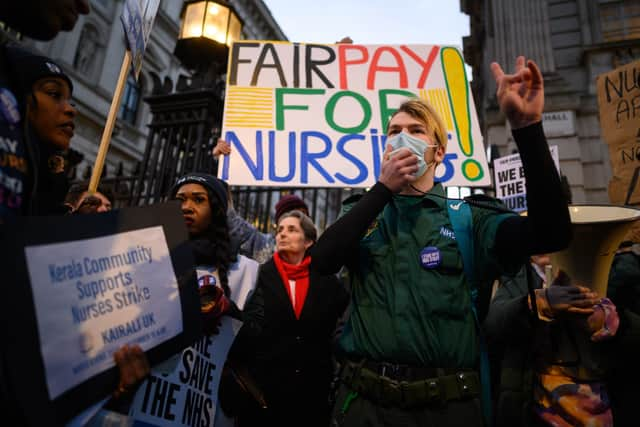Nurses from Royal College of Nursing set to vote on England-wide strike action after turning down pay rise
and live on Freeview channel 276
Nurses are set to vote on whether to hold strike action nationwide later this month, after rejecting the government’s five per cent pay rise. The Royal College of Nursing (RCN) wants to introduce strikes across all NHS trusts in England after strikes were held in select areas.
The RCN has held multiple strikes over the past few months and despite 14 health unions including Unison, GMB, the Chartered Society of Physiotherapists and the Royal College of Midwives accepting the government’s proposal of a five percent pay rise, the nurses union rejected the offer.
Advertisement
Hide AdAdvertisement
Hide AdA six month mandate in which the RCN could hold strikes ended last Monday (May 1). However, a new ballot will open on May 23, and last for a month until June 23.
Pat Cullen, head of the RCN, told MPs on Tuesday: "I would really urge the Secretary of State to get into the room this week with the Royal College of Nursing about pay and other issues.”
If nurses are to vote for further industrial action, it could mean every NHS trust in England where RCN members are employed could take industrial action for the first time. To achieve this, 50 percent of all eligible members must vote, with a majority saying ‘yes’ to strike action.
In an email to RCN members, Ms Cullen explained the reasons behind the ballot for continuing action. She said: "Every day, patients are at risk due to chronic staffing shortages. The government has tried to turn people against us by saying strikes are unsafe.


Advertisement
Hide AdAdvertisement
Hide Ad"But it’s their failure to invest in nursing that has made our wards unsafe. Record waiting lists, people left for hours in A&E, staff forced to treat patients in corridors - it’s all been caused by tens of thousands of nursing vacancies, not by our strikes."
